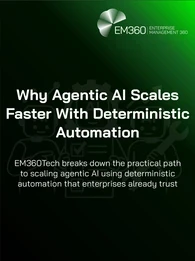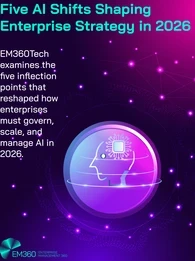"If AI has proven anything, it will change pretty rapidly. Understanding its limitations and not asking too much of it is significant. What’s successful is prototyping tools," said Rob Whiteley, CEO of Coder. "Such tools where AI can create an application, while not the world's most graceful code but will get you to working prototype pretty quickly. That would probably take me days or weeks of research as a developer, but now I have a working prototype so I can socialise it."
In this episode of the Tech Transformed podcast, Dana Gardner, a thought leader, speaks with Rob Whiteley, CEO of Coder, about the transformative impact of agentic AI on software development. They discuss how AI is changing the roles of developers, the cultural shifts required in development teams, and the integration of AI agents in cloud development environments.
Agentic AI is seemingly set up for favourable outcomes. Or is it? Agentic AI is believed to shake-up enterprise IT, offering a productivity boost similar to the iPhone's impact.
This isn't about replacing developers but amplifying their output tenfold. It aims to allow the implementation of rapidly created solutions and iteration that has been unimaginable in the past. This shift requires valuing "soft skills" like communication and collaboration over pure coding proficiency, as developers guide AI "pair programmers."
The synergy of AI agents, human intellect, and Cloud Development Environments (CDEs) is key. CDEs provide secure, governed, and scalable platforms for this collaboration, allowing developers to focus on business logic and innovation while AI handles the coding groundwork. This requires a move from rigid "gates" in development processes to flexible "guardrails" within CDEs. Such a move fosters innovation with built-in control and security.
Flexibility and choice are vital in this constantly advancing AI space. CDEs enable organisations to select the best AI agents for specific tasks, avoiding vendor lock-in by expressing the development environment as code. This leads to practical applications like faster prototyping, enhanced code development, and automated testing, significantly boosting code output. Furthermore, agentic AI democratises development, empowering non-engineers to build solutions.
Preparing for this future requires proactive experimentation through AI labs, engaging early adopters, and viewing AI as an augmentation of human skills. Watch the podcast for more insights on CDEs and the impact of AI agents on enterprise cloud development.
Takeaways
- Agentic AI is a transformative technology for software development.
- The role of developers is shifting from hard skills to soft skills.
- AI agents can significantly increase productivity in coding tasks.
- Organizations need to rethink their development strategies to integrate AI.
- Cloud development environments are essential for safely using AI agents.
- Choosing the right AI agent is crucial for effective development.
- Security and governance are critical when integrating AI into development.
- AI can empower non-developers to create applications.
- Guardrails are more effective than gates in managing AI development.
- Organisations should experiment with AI to find the best fit for their needs.
Chapters
00:00 Introduction to Agentic AI and Developer Roles
03:20 Transformative Impact of AI on Development
06:50 Cultural Shifts in Development Teams
10:30 Integrating AI Agents in Cloud Development Environments
12:49 Choosing the Right AI Agents
15:21 Security and Governance in AI Development
17:29 Coder's Role in the AI Development Landscape
20:14 Expanding Development Beyond Traditional Roles
23:27 Guardrails vs. Gates in Development
26:56 Practical Applications of AI in Code Generation
29:58 Acquiring AI Agents for Development
32:34 Preparing for the Future of Development with AI
AI Agents Redefine Dev Teams
How enterprises pair human engineers with AI agents to offload low-value work, raise throughput, and keep control through in-loop oversight.
About Coder
Coder is a remote-first company with products used by many of the world’s largest enterprises. Coder provides an enterprise platform and open source tools that make it easier than ever to configure, secure, and manage software development environments.
Leave hardware limitations behind and welcome accelerated code execution, providing you and your developers with unmatched efficiency and elevated productivity. This enables an organisation to innovate rapidly and maintain a competitive edge.









Comments ( 1 )
Dana Gardner
28/04/2025